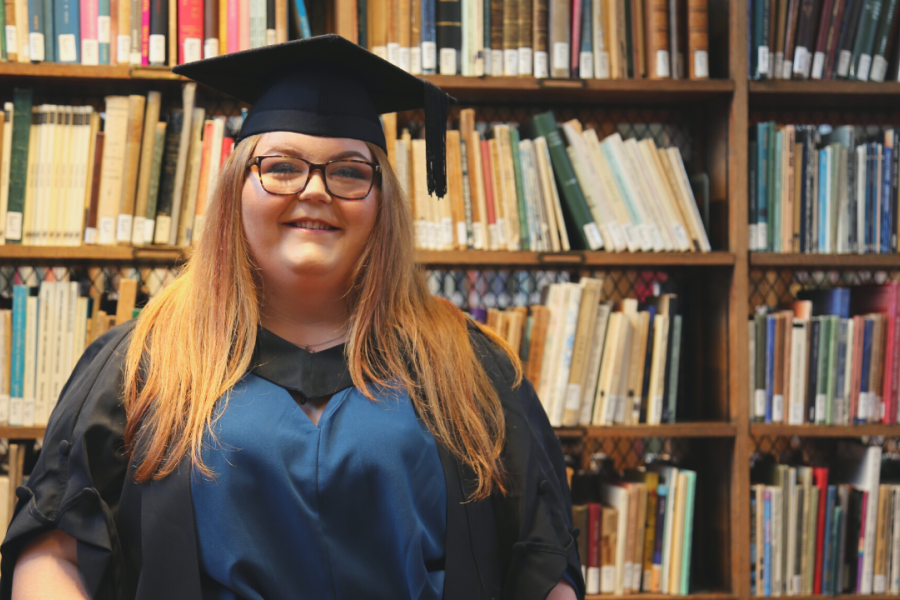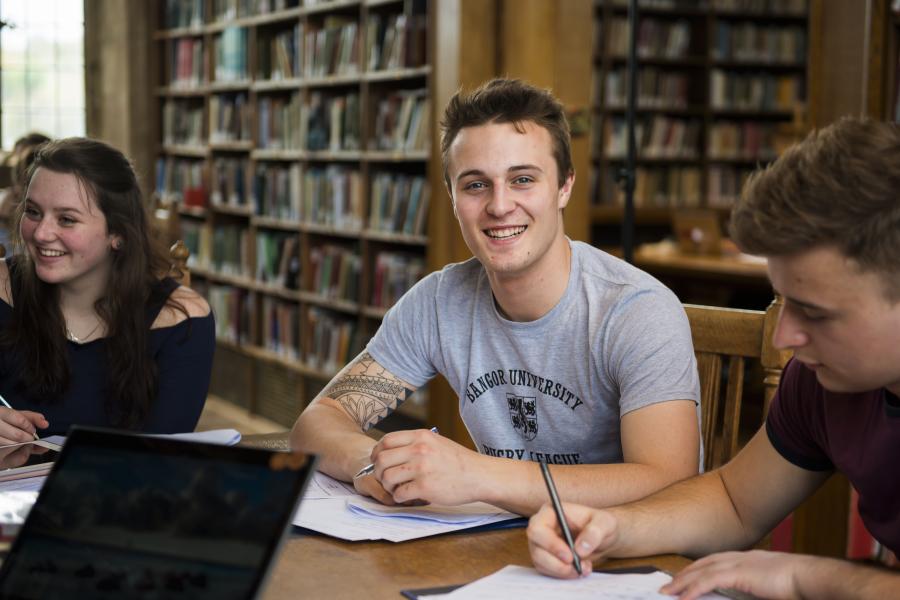About This Course
Did you know that a BA in Welsh at Bangor is much more than a degree course? It is a complete cultural experience that will enable you to play a professional role in the excitement of creating a truly bilingual Wales. In areas such as education, the creative industries and the heritage, broadcasting and media sectors, public relations and marketing, translation, language planning and public administration, Bangor graduates fulfill important roles. They are among the leaders of our contemporary Wales and shaping our future.
Welsh at Bangor is a living language of the present day rather than a relic of the past. Here you will have the opportunity to not only study and enjoy one of the most remarkable Celtic literatures in the world, but there will also be opportunities to pursue more practical modules that will prepare you for a career. This course will enable you to research independently, to practise original thinking, to get to know Welsh literature and culture in depth and to master the various registers of the language. If you so wish, you will have the opportunity to pursue your creative interests under the guidance of experienced writers and poets. You will also gain an awareness of the Welsh language in wider international contexts. What is the relationship of Welsh with the other languages of the world? How does the fate of the language compare with languages like Basque and Irish? How have Welsh writers and poets responded to global themes such as slavery, the Holocaust and the ecological challenge of the modern industrial world? From the earliest times to the present, the choice of modules is wide and the opportunities to broaden your horizons are endless.
Students from both first and second language backgrounds are accepted to follow this course. It is also a natural progression for students who followed the Welsh for Beginners foundation year. It is also suitable for those who have achieved proficiency in Welsh, e.g. through the Learn Welsh courses at the National Centre for Learning Welsh.
Why choose Bangor University for this course?
- A world-renowned centre for the study of Welsh and Celtic Studies.
- Study in the unique Celtic linguistic environment of Gwynedd (north-west Wales) where Welsh remains the language of the majority.
Additional Course Options
This course is available with a Placement Year option where you will study for 1 additional year. The Placement Year is undertaken at the end of the second year and students are away for the whole of the academic year.
The Placement Year provides you with a fantastic opportunity to broaden your horizons and develop valuable skills and contacts through working with a self-sourced organisation relevant to your degree subject. The minimum period in placement (at one or more locations) is seven calendar months; more usually you would spend 10-12 months with a placement provider. You would normally start sometime in the period June to September of your second year and finish between June and September the following year. Placements can be UK-based or overseas and you will work with staff to plan and finalise the placement arrangements.
You will be expected to find and arrange a suitable placement to complement your degree and will be fully supported throughout by a dedicated member of staff at your academic School and the University’s Careers and Employability Services.
You will have the opportunity to fully consider this option when you have started your course at Bangor and can make an application for a transfer onto this pathway at the appropriate time. Read more about the work experience opportunities that may be available to you or, if you have any questions, please get in touch.
This course is available with an International Experience Year option where you will study or work abroad for 1 additional year. You will have ‘with International Experience’ added to your degree title on graduating.
Studying abroad is a great opportunity to see a different way of life, learn about new cultures and broaden your horizons. With international experience of this kind, you’ll really improve your career prospects. There are a wide variety of destinations and partner universities to choose from. If you plan to study in a country where English is not spoken natively, there may be language courses available for you at Bangor and in your host university to improve your language skills.
You will have the opportunity to fully consider this option at any time during your degree at Bangor and make your application. If you have any questions in the meantime, please get in touch.
Read more about the International Experience Year programme and see the studying or working abroad options on the Student Exchanges section of our website.
Course Content
The teaching is through lectures, seminars, tutorials and workshops. You will write essays, undertake various weekly exercises and tasks, reading and preparing for seminars. Assessment is a combination of coursework and examinations, with some modules assessed solely on the basis of coursework. Your modules each year will be equivalent to 120 credits. (If you are from a second language background, 60 credits in the first year will be specifically for you and a continuation of your language experiences to date. You will join first language students to study the other 60 credits and tutorials will be arranged to support you. Additional language support is also provided in the second and third years.)
The first year will be an opportunity to build on your experiences and open new doors: e.g. discussing the language in contexts relating to its history and present-day state, learning new critical skills and responding originally to literature. You will choose from a wide range of modules in your second and third years, e.g. the novel from Daniel Owen to Dewi Prysor, Welsh language theatre from Saunders Lewis to Aled Jones Williams, modern poetry and eisteddfod authors, Meic Povey’s television dramas, Dafydd ap Gwilym, the Mabinogion - or why not study Welsh American Welsh language culture and even ask "What is Literature?" Language modules range from historical to sociological, from the opportunity to learn Irish and Breton to modules that develop professional Welsh language skills in the workplace and also Welsh language skills for creative purposes. In the third year you will write a dissertation and research an interesting topic of your choice. Recent topics include individuals such as Dafydd ap Gwilym, Kate Roberts, Mihangel Morgan, Angharad Tomos, Caryl Lewis, Meic Stevens and Geraint Jarman and areas such as eco-criticism, gender and transgender, the language of Pembrokeshire, Welsh literature and slavery, literature and horses and football in literature.
Modules for the current academic year
Module listings are for guide purposes only and are subject to change. Find out what our students are currently studying on the Cymraeg / Welsh (For First- and Second-language) BA (Hons) Modules page.
Course content is for guidance purposes only and may be subject to change.
Facilities
General University Facilities
Library and Archive Services
Our four libraries provide a range of attractive study environments including collaborative work areas, meeting rooms and silent study spaces.
We have an extensive collection of books and journals and many of the journals are available online in full-text format.
We house one of the largest university-based archives not only in Wales, but also the UK. Allied to the Archives is the Special Collections of rare printed books.
Learning Resources
There is a range of learning resources available, supported by experienced staff, to help you in your studies.
The University’s IT Services provides computing, media and reprographics facilities and services including:
- Over 1,150 computers for students, with some PC rooms open 24 hours a day
- Blackboard, a commercial Virtual Learning Environment, that makes learning materials available on-line.
Course Costs
General University Costs
Home (UK) students
- The cost of a full-time undergraduate course is £9,000 per year (2021/22 entry and 2022/23 entry).
- The fee for all placement, international, and sandwich years is £1,350 (2021/22 and 2022/23).
- More information on fees and finance for Home (UK) students.
International (including EU) students
Additional Costs
There are also some common additional costs that are likely to arise for students on all courses, for example:
- If you choose to study abroad or take the International Experience Year as part of your course.
- If you attend your Graduation Ceremony, there will be a cost for gown hire (£25-£75) and cost for additional guest tickets (c.£12 each).
Course-specific additional costs
Depending on the course you are studying, there may be additional course-specific costs that you will be required to meet. These fall into three categories:
- Mandatory Costs: these are related to a particular core or compulsory module that you’ll be required to complete to achieve your qualification e.g. compulsory field trips, uniforms for students on placement, DBS Check.
- Necessarily Incurred Costs: these may not be experienced by all students, and will vary depending on the course e.g. professional body membership, travel to placements, specialist software, personal safety equipment.
- Optional Costs: these depend on your choice of modules or activity and they are shown to give you an indication of the optional costs that may arise to make sure your choice is as informed as possible. These can include graduation events for your course, optional field trips, Welcome Week trips.
Entry Requirements
Offers are tariff based, 96 - 128 tariff points from a Level 3 qualification e.g.:
- A Levels: including grade B in Welsh (or a grade B in a humanities subject studies through the medium of Welsh - e.g. History, Geography, Religious Studies). General Studies and Key Skills not normally accepted
- BTEC National Extended Diploma**: MMM-DDM
- Cambridge Technical Extended Diploma**: MMM-DDM
- City & Guilds Advanced Technical Extended Diploma (1080): considered on a case-by-case basis
- International Baccalaureate Diploma: including grade H5 in Welsh**
- Access**: pass required
- Welsh Baccalaureate: We will accept this qualification in conjunction with other level 3 qualifications
- T Levels: T Levels in a relevant subject considered on a case-by-case basis
- Extended Project Qualification: Points can include a relevant Extended Project (EPQ) but must include a minimum 2 full A-levels, or equivalent.
We are happy to accept combinations of the qualifications listed above, as well as alternative Level 3 qualifications such as City & Guilds, Access and Cambridge Technical Diplomas.
We also welcome applications from mature learners.
International Candidates: school leaving qualifications that are equivalent to A levels/Level 3 and/or college diplomas are accepted from countries worldwide (subject to minimum English Language requirements). More information can be found on our International pages.
*For a full list of accepted Level 3 qualifications, go to www.ucas.com.
**Can be considered in conjunction with another qualification in Welsh or taken through the medium of Welsh (e.g. A Levels).
General University Requirements
To study for a degree, you’ll be asked for a minimum of UCAS Tariff points. For a fuller explanation of the UCAS Tariff Points, please see www.ucas.com.
We accept students with a wide range of qualifications and backgrounds and consider each application individually.
All students need to have good basic skills and the University also values IT and communication skills.
As part of the University’s policy, we consider applications from prospective disabled students on the same grounds as all other students.
We also consider applications from mature students who can demonstrate the motivation and commitment to study a university programme. Each year we enrol a significant number of mature students. For more information about studying as a mature student, see our Studying at Bangor section of the website.
EU and International Students' Entry Requirements
For detailed guidance on the entry requirements for EU and International Students, including the minimum English Language entry requirement, please visit the Entry Requirements by Country pages. International applicants can also visit the International Education Centre section of our website for further details.
Bangor University offers International Incorporated Bachelor Degrees for International students whose High School qualification is not equivalent to the UK school leaving qualification. The first year (or Year 0) is studied at Bangor University International College, an embedded College on our University campus and delivered by Oxford International Education Group.
Careers
There has never been a more exciting time to study Welsh at Bangor. There has never been more demand for a workforce that can use Welsh at senior professional levels. The goal is clear, it has been set by the Welsh Government - a million Welsh speakers by 2050 and a truly bilingual Wales.
In pursuit of that aim, there will be a great need for confident Welsh-speaking graduates, who can use their language skills in flexible ways, who can think analytically through the medium of the language and use it - both orally and in writing - in various work situations.
The remarkable professional success of our students in employment - and their varied careers - already proves how entirely relevant this course is to the requirements of contemporary Wales. A proportion of them go into education, to be primary and secondary teachers, headteachers, education officers and directors of education. Others go into further education and others become university lecturers. Teaching Welsh for adults is also a key area. Television and digital and print media - including the BBC centre in Bangor - offer a cross-section of interesting jobs and have attracted other alumni into book publishing, creative writing and television scripting, public relations and marketing. There is also continuing demand for bilingual administrators and local government officers. And without the presence of Bangor's Welsh graduates, the translation industry would be quite different. And present day graduates also have every right to aim high. The National Library of Wales, The National Theatre of Wales, Cwmni Da (one of Wales' largest production companies), the Welsh Parliament’s Translation and Reporting Service and Anglesey Council - what do they have in common? Bangor's Welsh graduates have reached the top of their professional careers in them and are at the forefront of them all!
Opportunities at Bangor
The University’s Careers and Employability Service provides a wide range of resources to help you achieve your graduate ambitions.
The Bangor Employability Award (BEA)
The BEA is a comprehensive online course that you can work through at your own pace, taking you through all the steps you need to take to explore, prepare and apply for your dream career.
Internships
Bangor University runs a paid internship scheme within the university’s academic and service departments.
Student Volunteering
Volunteering widens your experience and improves your employability. Find out more about volunteering on the Students’ Union’s website.
Foundation Year
A Foundation Year option is available for this course. Apply for Welsh for Beginners.
What is a Foundation Year course?
If you don’t have the required qualifications for the degree-level course or are looking to re-enter education after time away from study, then a Foundation Year Programme might be the right choice for you.
The Foundation Year is an excellent introduction to studying this subject at university and will provide you with the knowledge, skills and confidence required to go on to study this course at degree-level.
When you have successfully completed the Foundation Year, you can progress on to the first year of this degree-level course.





